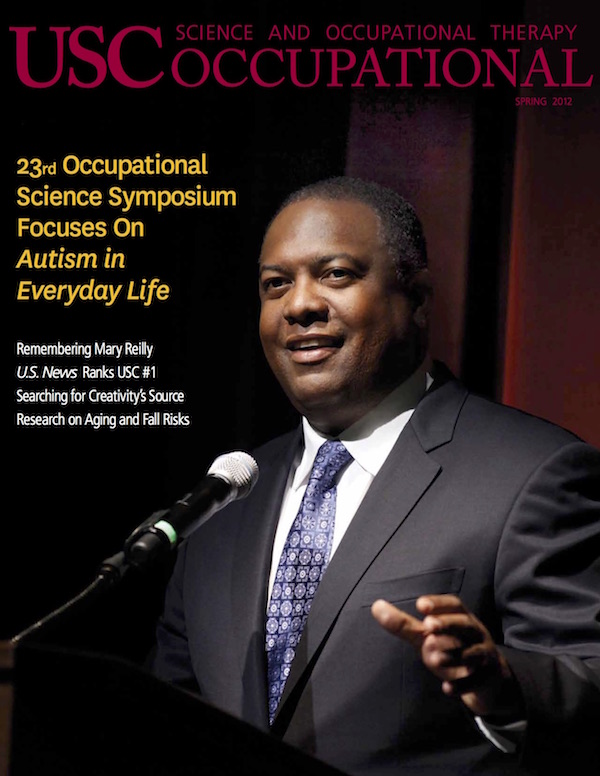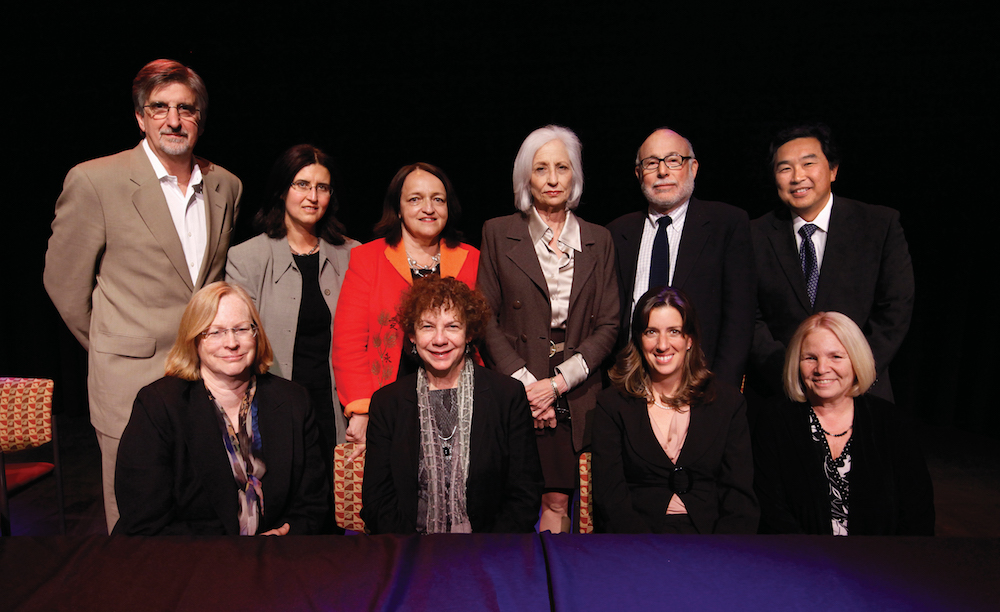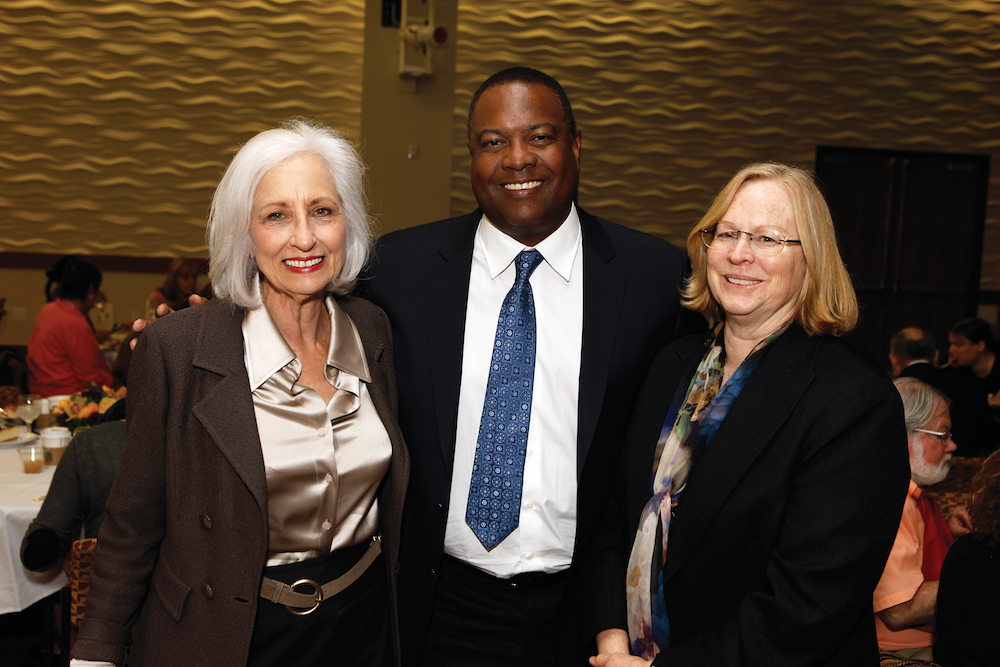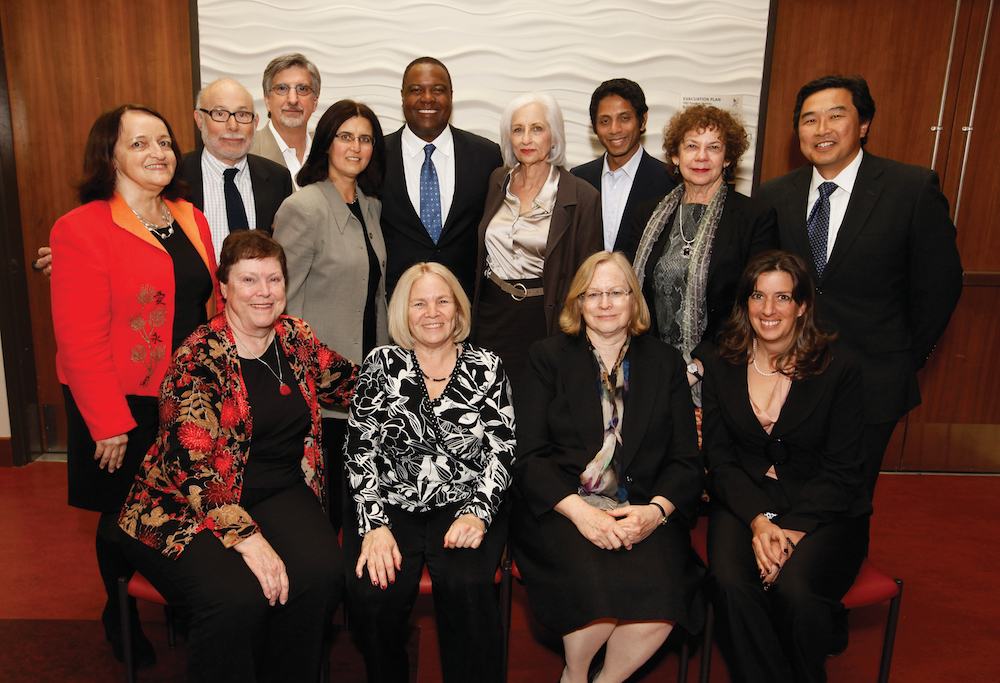23rd Occupational Science Symposium
USC’s scientific and advocacy community gathers to share research and insights into Autism in Everyday Life.
On March 9, 2012, over three hundred faculty members, students, alumni and community partners gathered at the USC Ronald Tutor Campus Center for the 23rd Occupational Science Symposium, hosted by the Division of Occupational Science and Occupational Therapy at the Ostrow School of Dentistry of USC. The 2012 rendition of the symposium was entitled “Autism in Everyday Life: Interdisciplinary Research Perspectives at USC,” and each of the day’s speakers shared their innovative research, clinical practices, or personal perspectives on autism and its impact on everyday life experiences.
2012 Symposium speakers (back row L-R) Pat Levitt, Olga Solomon, Mary Lawlor, Florence Clark, Mark J. Harris, Larry Yin (front row L-R) Catherine Lord, Marsha Kinder, Barbara Thompson, Sharon Cermak | Photo by Steve Cohn
Florence Clark, associate dean of the division, opened the event with a moving tribute to the late Mary Reilly (BS ’51), former director of the graduate program in occupational therapy at USC during the 1960s and ‘70s, who passed away on February 28 at the age of 95. Reilly was an iconoclastic leader who pushed the profession to explore and embrace philosophies of human behavior which ultimately laid the groundwork for establishing the academic discipline of occupational science. Clark also posthumously accepted the Pathways.org Pioneer Award on behalf of A. Jean Ayres (PhD ’61, MA ’54, BA ’45), who was a renowned developmental psychologist and former USC faculty member.
Mary Lawlor, professor and director of research at the division, unveiled the division’s new Sensory Integration, Engagement and Family Life Initiative. This initiative aims to capitalize on the division’s research expertise in autism-related fields, relocate faculty offices and laboratories to leverage the value of physical proximity, and continue building a robust portfolio of NIH-funded research on projects related to autism and autism spectrum disorders (ASD).
Catherine Lord, this year’s recipient of the division’s Patricia Buehler Legacy Award for Clinical Innovation, delivered her keynote address entitled “Early Intervention in Autism Spectrum Disorders: Alternatives and Priorities.” Lord is Director of the Center for Autism and the Developing Brain, a subsidiary of Weill Cornell Medical College and New York-Presbyterian Hospital. She is best known for developing gold-standard assessment tools used to diagnose autism and ASD, and emphasized the synergies between her work’s objectives to more accurately diagnose children with autism and the clinical therapeutic interventions that typically follow diagnosis.
Pat Levitt, director of the Zilkha Neurogenetic Institute and chair of the Department of Cell and Neurobiology at the Keck School of Medicine of USC, presented his lecture entitled “Looking at Autism through a Neurobiological Lens.” A neuroscientist, Levitt’s human genetics and basic research studies focus on understanding the causes of neurodevelopmental and neuropsychiatric disorders such as autism. His clinical studies address autism heterogeneity by studying children with autism who also have co-occurring medical conditions, such as gastrointestinal disorders, with the goal to develop better diagnostic criteria and personalized treatments.
Clark returned to the stage to outline evidence demonstrating the effectiveness of sensory integration interventions for children with autism and ASD.
For many, the Symposium highlight was lunch guest speaker Rodney Peete (BA ’89). Peete, a former USC and National Football League quarterback, is also father to a son with autism, Rodney Jackson “R.J.” Peete. Since retiring from football, Peete has become an ardent advocate for autism awareness, education, and family support largely through the work of his non-profit HollyRod Foundation which he cofounded with wife, actress Holly Robinson Peete. In 2010 he released his first book, Not My Boy! A Father, a Son, and One Family’s Journey with Autism, which chronicles his family’s experience raising a child with autism.
Associate dean Florence Clark (L) greets Rodney Peete (C) and Buehler Award recipient Catherine Lord (R) | Photo by Steve Cohn
Peete described R.J.’s birth and early childhood development with the beaming pride of a new father. But as R.J.’s developmental skills began to stall at approximately age two and a half, while his wife grew concerned Peete recalled his own denial and stubbornness to seek professional help, driven in part by his own competitive personality and athletics background. He then vividly recounted what he calls their family’s “never day” in 2000, which was the day when R.J. was diagnosed with autism and the physician listed the “never’s” erroneously assumed to accompany an autism diagnosis: never going to college, never getting married, and never saying “I love you.”
Peete also spoke about the day when he decided to pursue as much professional assistance and education as possible in order to help his son. “From that moment on, I started to see the world through R.J’s eyes, not mine,” Peete said. With years of direct clinical intervention — including occupational therapy — Peete reported that R.J., now fourteen years old, has made significant progress in his social, communicative, and functional skills. R.J. currently attends mainstream school classes, plays the piano, and most importantly to his parents, says “I love you.”
The Peete family has become celebrated advocates for autism education and awareness, especially in the African American community. Peete thanked Olga Solomon, assistant professor, for her NIH-funded research study “Autism in Urban Context” which is examining health and service disparities in autism and ASD diagnoses of African American children in Los Angeles.
At the conclusion of his address, Peete received a standing ovation from the ballroom audience. “Rodney’s story gave voice to an oft-unheard perspective in the everyday autism experience: the father’s, and there was not a dry eye in the room,” said associate dean Florence Clark.
Susan Knox (PhD ’97, MA ’68), the recipient of the division’s 2012 Wilma West Award in recognition of career contributions to the discipline of occupational science, lectured on the themes of meaning, belonging, and play as related to persons with autism and ASD who are aging into retirement. Knox has a younger brother with autism, and she has authored a standardized tool assessing play styles in preschool children and lectured extensively on play styles and autism.
Two discussion panels followed, featuring faculty from the Division of Occupational Science and Occupational Therapy, the Viterbi School of Engineering, the Keck School of Medicine of USC, and the School of Cinematic Arts.
Above: 2012 Occupational Science symposium speakers (back row standing L-R): Mary Lawlor, ScD, OTR/L, FAOTA, professor and director of research, Division of Occupational Science and Occupational Therapy; Mark J. Harris, distinguished professor, USC School of Cinematic Arts; Pat Levitt, PhD, director, Zilkha Neurogenetic Institute, chair, department of cell and neurobiology, Keck School of Medicine of USC, provost professor of neuroscience, pediatrics, psychology, psychiatry and pharmacy; Olga Solomon, PhD, assistant professor, Division of Occupational Science and Occupational Therapy; Rodney Peete, former USC and NFL quarterback, author; Florence Clark, PhD, OTR/L, FAOTA, associate dean, chair, and professor, Division of Occupational Science and Occupational Therapy; Shrikanth Narayanan, PhD, professor, USC Viterbi School of Engineering; Marsha Kinder, PhD, university professor, USC School of Cinematic Arts; Larry Yin, MD, MSPH, assistant professor of clinical pediatrics, Keck School of Medicine of USC, director of community services, USC University Center of Excellence in Developmental Disabilities, medical director, Boone-Fetter Clinic, Children’s Hospital Los Angeles; (front row seated L-R): Susan Knox, PhD, OTR/L, FAOTA, 2012 Wilma West lecturer; Sharon Cermak, EdD, OTR/L, FAOTA, professor, Division of Occupational Science and Occupational Therapy; Catherine Lord, PhD, 2012 Patricia Buehler Legacy Award for Clinical Innovation, assistant professor of psychology in psychiatry, Weill Cornell Medical College, attending psychologist, New York-Presbyterian Hospital; Barbara Thompson, PhD, assistant professor, Division of Occupational Science and Occupational Therapy | Photo by Steve Cohn
More information about the USC Chan Occupational Science Symposium is available on-line at chan.usc.edu/events/symposium.
⋯









